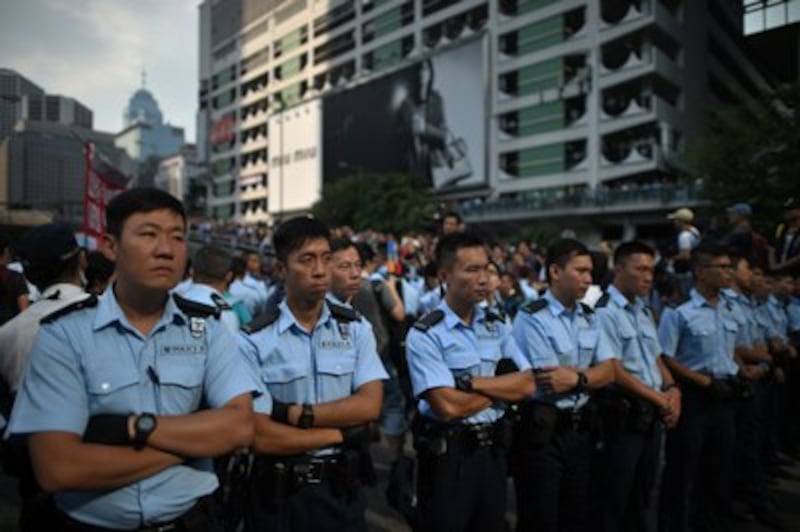Authorities in Hong Kong began moving to clear barricades blocking streets occupied by pro-democracy protesters on Monday, while a prominent student activist called on citizens to boost numbers at key protest sites following further clashes with anti-Occupy groups.
Hong Kong police said they would continue removing barricades, though, after moving to free sections of road in the Central business district and the busy Kowloon shopping district of Mong Kok.
By late Monday, thousands of protesters had gathered at the main Occupy site in Admiralty, listening to speeches and music and setting up rows of brightly colored tents on Harcourt Road for the night.
"We will not eliminate the possibility of using minimal force or arrest actions," police senior superintendent Steve Hui told a news conference on Monday.
Earlier, police arrested three men, one for assault and two for carrying offensive weapons, after anti-Occupy groups stormed barricades in Mong Kok and Admiralty in a bid to remove obstacles to traffic.
Taxi-drivers sounded their horns in protest at the continuing occupation of major highways, which entered its third week of campaigning for public nomination of candidates in the territory's planned one-person, one-vote elections for the chief executive in 2017.
"There were about 100-200 of them, carrying pliers and stuff like that," an Occupy protester said after clashes broke out between both sides and police. "They were wearing masks, and they dragged away a lot of the barricades."
"When the police saw they were carrying [potential] weapons, they went and stopped them."
An Associated Press report said some of the group were carrying box-cutting knives, which they used to cut the plastic ties holding the barricades together.
An anti-Occupy protester defended the group's actions, however.
"They are getting in a lot of people's way, and we can't use the road unless we remove the barricades," he told RFA. "I'm not a triad member, don't get me wrong. I'm acting on my own behalf."
Chief executive criticized
Protesters led by the Occupy Central group, the Hong Kong Federation of Students (HKFS), and the academic activist group Scholarism said on Sunday that chief executive C.Y. Leung had failed to give an accurate report of public consultations on the election process to Beijing.
They want the ruling Chinese Communist Party to change its mind about an Aug. 31 ruling by its rubber stamp National People's Congress (NPC) that limits candidates to two or three people, hand-picked by a pro-Beijing committee.
Pro-democracy politicians and protesters alike have dismissed the NPC plan as "fake universal suffrage," because they mean a pro-democratic candidate is highly unlikely to be selected.
Demonstrators meanwhile have repeatedly called for Leung's resignation, with students saying Leung has failed to take into account the wishes of 700,000 people who voted in an unofficial online referendum in support of public nominations.
HKFS leader Alex Chow said criminal "triad" gangs were likely behind the clashes. "Of course we condemn the violent actions against Occupy protesters," he said.
"It seems that this was a concerted move that had been planned beforehand," Chow said, adding, "I don't know if anyone orchestrated it."
"But it's a bit suspicious that it happened [on both sides of the harbor] at the same time."

Protest numbers grow
Scholarism convener Joshua Wong meanwhile called on Hong Kong people to come out and swell the crowds of protesters after numbers dwindled in the early hours of Monday morning.
Wong, who celebrated his 18th birthday on Monday, called on his fellow protesters to continue the fight for "true universal suffrage."
On his Facebook page, Wong listed three birthday wishes: "Safety for family members, my girlfriend, and other fellow students," as well as "willpower" to his fellow protesters.
The number of people occupying both sites grew by Monday evening, while verbal confrontations between demonstrators and those who oppose them continued, particularly in Mong Kok, where the protest site is more accessible to passersby.
Hundreds of protesters at Mong Kok left hundreds of small yellow paper umbrellas bearing messages at the site.
"I wrote four characters: making history," one protester said after hanging up their own personal message. "I thought of it on the spur of the moment, and just wrote it."
But he said he wasn't a long-term occupier at the site. "I just got here," he said. "I have been here once before as well."
A second Mong Kok protester said he was digging in until the government gives in.
"I'll stick it out until the government gives us genuine universal suffrage," he said.
Call to clear the roads
Associations of taxi-drivers and private minibus and goods vehicle drivers have hit out at the continuing protests, saying they will seek a court injunction to clear protesters from the highways.
"I think the students can understand the legal logic, and we hope that the court will grant us an injunction," Frankie Yick, transportation and logistics industry lawmaker, told reporters.
"Our aim is simply to stop them from obstructing the highway. As for damages, whom would we pursue?" Yick said. "We will be taking detailed legal advice on this."
Meanwhile, Phyllis Kwong, President of the Asia Pacific Law Association, said she is pursuing seven defendants in a bid for a court injunction, including the three organizers of Occupy Central, as well as the leaders of the HKFS and Scholarism.
Pro-democracy lawmakers hit out at the government for allowing 'mobs' to attack protesters.
"This is one of the tactics used by the communists in mainland China from time to time," Democratic Party lawmaker Albert Ho told Agence France-Presse.
"They use triads or pro-government mobs to try to attack you so the government will not have to assume responsibility."
And Civic Party lawmaker Claudia Mo said she suspected the police moved the barricades to make it easier for the anti-Occupy groups to get through.
Reported by Wen Yuqing, Luo Bote, Dai Weisen and Lin Jing for RFA's Cantonese Service, and by Qiao Long and Xin Lin for the Mandarin Service. Translated and written in English by Luisetta Mudie.
